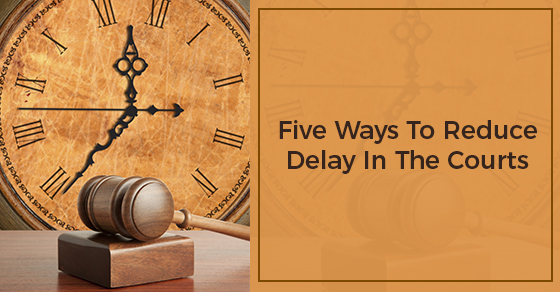Five Ways To Reduce Delay In The Courts

The justice system in Canada is in crisis. It is a crisis that has been building for decades, and for many reasons. Despite the steady drop in crime rates, the growth in population, especially in the cities, has meant an increase in the number of defendants in court. Governments have not invested sufficiently in the resources necessary to address this growth.
In many cases, such as Toronto and Peel Region, municipalities have increased the size of their police forces. More cops means more arrests, more charges, more court cases. But the number of prosecutors and judges and courtrooms has not kept pace with this growth.
The Charter of Rights is intended to protect Canadians from government abuses, but challenging such abuses is time-consuming and complicated. The politicians pass laws designed to address certain interests, such as victims, third parties, or their political base, by imposing extra litigation requirements (leave to cross-examine on prior sexual history; leave to cross-examine an affiant; third party records) or mandatory minimum sentences, that add to court time or reduce the number of guilty pleas. Fewer guilty pleas means more cases take up valuable time and resources in trial courts.
But the province, which staffs the Crowns’ offices, appoints the judges, and maintains the courthouses, has not kept pace with this growth in number and complexity of cases. The result is backlogged courts, and overburdened prosecutors who don’t have the time to properly review their cases. This backlog fosters an emergency room mentality, where most decisions are last-minute responses to an immediate problem. The quickest and easiest solutions are imposed, not the most reasonable or appropriate ones. The players in the justice system, like soldiers in the trenches of World War One (and our old-fashioned, paper-based, creaky system justice system resembles that era more than the modern one), are just happy to have survived another day. Winning the war is at best a distant dream.
Everyone pays the price for a justice system that is backlogged and seemingly incapable of managing its caseload: victims and witnesses, burned out lawyers and judges, court staff, and Canadians who are facing criminal charges and the potential loss of their liberty.
In the now infamous Jordan decision, the Supreme Court has now put its foot down on the delays that have had such an impact on the justice system, and its tarnished image among Canadians. The court has imposed hard deadlines of 18 months for provincial court cases (where 90% of criminal cases are handled) and 30 months for superior court cases. The main reason for the difference in these limits is that superior court cases are usually preceded by a preliminary inquiry, designed to clarify and focus the issue in the case.
These hard limits imposed by the Supreme Court do not distinguish between the different levels of complexity and time requirements between, say a murder or large gang prosecution on one hand, and a sexual assault involving two witnesses. The Supreme Court’s “one-size-fits-all” time limit will create serious problems for the most complex cases. Many will be dismissed for delay without a trial, and the most aggrieved parties, the victims of crime, will be denied justice. In some instances, dangerous criminals will walk free. And the reputation of the justice system will suffer. Headlines about accused killers being freed on “technicalities” will lead to politicians implementing drastic solutions that help no one.
We are already seeing governments looking for a quick fix to the problem by dusting off the easiest, quickest, and cheapest solutions from their policy cupboard. Eliminating preliminary hearings is one example. It costs nothing, and sounds good to the public because it eliminates a step available to a defendant to challenge the case against him. But there are no quick and easy solutions to such complex and intractable problems. Take the current quick fix of eliminating the preliminary inquiry. Prelims are only available in cases where the Crown is proceeding by indictment, which is about only 10% of cases. The government has already streamlined preliminary hearings by making it easier to introduce evidence, and by creating the “discovery” option whereby a judge is not required in many cases. These discoveries happen much more quickly and take up less time and resources than the traditional prelim. Eliminating the preliminary inquiry will do very little to eliminate the backlog in the courts. In fact, because prelims do help to clarify and focus the trial issues, they tend to save time at trial. Eliminating them is likely to simply add that expenditure of time to the trial itself, solving nothing in the end.
Instead of looking for a quick fix, all the parties in the justice system (judges, prosecutors, defence lawyers, victims’ rights advocates, etc.) should come together to seek long-term, rational solutions to this crisis. These solutions should take the interests of all stake-holders into account, including the rights of defendants and victims, and the public purse. Every year the federal government and the provinces convene to discuss solutions to the health care crisis in this country. A summit to discuss the criminal justice system would be a good start. Everything should be on the table, and let the best and most experienced minds come together to propose solutions. Experiment with pilot projects. Be creative. Look to what works in other jurisdictions, and other countries. By being comprehensive, transparent and inclusive, such discussions would not only produce the best solutions, but would also win the support of Canadians. Canadians understand that a fair, open and efficient justice system that works properly, is one of the pillars of our democratic society.
Let’s try to get it right this time.

